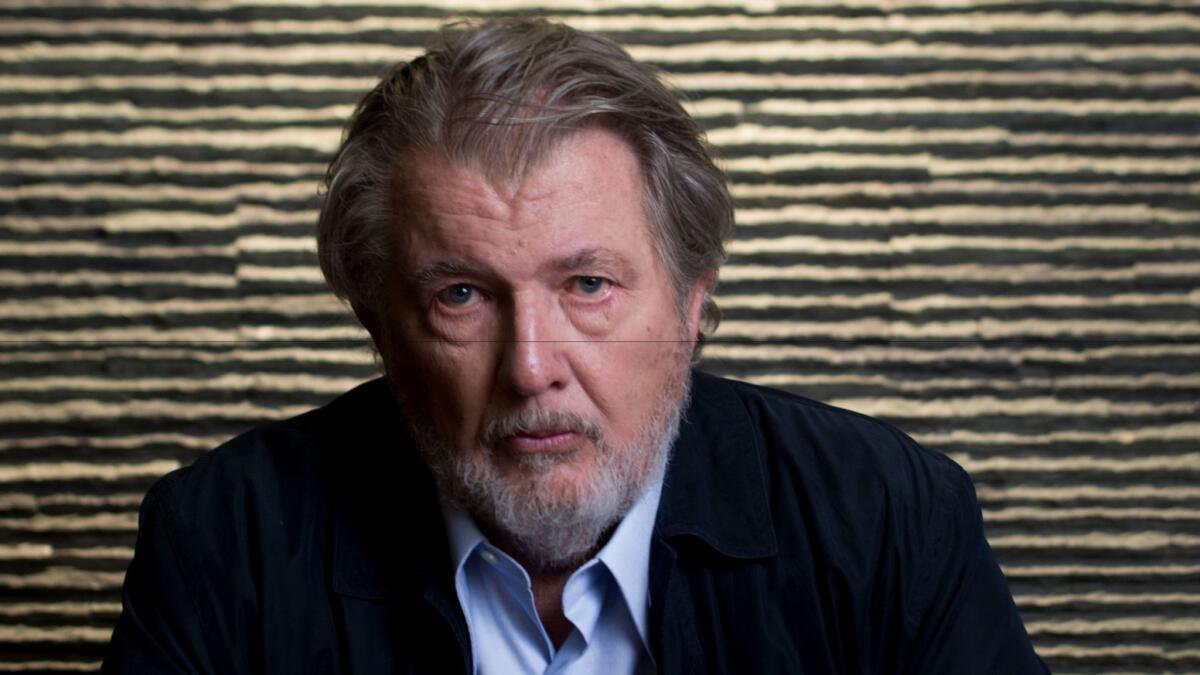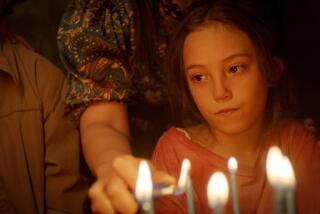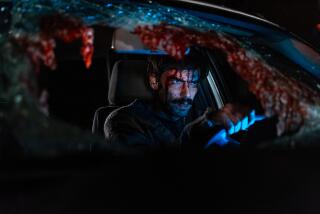Newsletter: Indie Focus: Joining the conversation with ‘Five Came Back,’ ‘Donnie Darko’ and Walter Hill
Hello! I’m Mark Olsen, and welcome to another edition of your regular field guide to a world of Only Good Movies.
The new movie “Ghost in the Shell” had me thinking a lot this week about critics, movie journalism and how the conversation around a movie can come to define that movie. In some ways a movie only comes to really matter because of conversation around it, and “Ghost” generated some inspired, thought-provoking writing, including Justin Chang for The Times, Emily Yoshida for Vulture and Alison Willmore for Buzzfeed.
The TCM Classic Film Festival kicks off on Thursday and runs through Sunday, April 9. It is always a treat because of the expertly chosen lineup, this year running from “America America” to “Zardoz,” but also for the madcap enthusiasm of the audience members. This year will be especially poignant given the recent death of network host Robert Osborne, to whom this year’s festival is now dedicated.
Our screening last week of Marc Webb’s “Gifted” was powered by 10-year-old star Mckenna Grace’s boisterous enthusiasm. We will be showing “The Lost City of Z” with director James Gray on hand for a Q&A on Monday, April 3. Gray is a world-class talker about movies, and it’s a conversation I’m really looking forward to. Keep on the lookout for updates and future events at events.latimes.com.
‘Five Came Back’
Premiering on Netflix (and getting a limited theatrical run) is a three-part documentary series called “Five Came Back,” based on the 2014 book by Mark Harris that covers the experiences of five Hollywood directors during World War II.
Meryl Streep is the film’s narrator, and contemporary filmmakers are paired with each of the five filmmakers for a mix of authority and admiration, so that the impressive casting features Steven Spielberg for William Wyler, Guillermo del Toro for Frank Capra, Paul Greengrass for John Ford, Francis Ford Coppola for John Huston, Lawrence Kasdan for George Stevens.
Netflix is also currently featuring some of the films created by the filmmakers during the war, including Huston’s “San Pietro” and “Let There Be Light,” which were an influence on Paul Thomas Anderson’s “The Master.”
For The Times, Kenneth Turan noted that “Hollywood’s directors weren’t always boyish figures who looked good in baseball caps. Once upon a time they were full-fledged adults whose life experiences included the darkest sides of human nature.” And of the five filmmakers featured, “They all unhesitatingly abandoned their careers at the start of World War II in order to work for the common good, an action that changed their lives, and their films, forever.”
In the New York Times, Ben Kenigsberg wrote: “Above all, ‘Five Came Back’ is an invitation to see more: It’s hard to watch it without wanting to visit (or revisit) Wyler’s ‘Mrs. Miniver’ or Ford’s ‘They Were Expendable.’ It’s further proof, if any were needed, that these men weren’t simply creating propaganda, but art that would endure.”
At the Guardian, Peter Bradshaw wrote: “This film is the story of how these directors changed the war. … But it was the fact that they were movie directors that was important: they were natural leaders, autocratic and attuned to the field of battle. In that analogue age, movies were about marshalling huge numbers of people in actual spaces.”
Harris gave an interview to Kris Tapley at Variety on adapting his book into a multi-part doc series and in particular using current filmmakers to help move the film. “It ended up feeling organic,” Harris said. “We decided we’d see what parts of the story they felt comfortable guiding us through, and what dovetailed nicely with their insights into who these directors were.”
‘Donnie Darko’
Richard Kelly’s 2001 apocalyptic suburban sci-fi teen drama “Donnie Darko” has had an unusual life befitting such an unusual movie. A flop on its initial release, the film built a cult following that resulted in a 2004 director’s cut and an ongoing afterlife for its story about a boy struggling with mental illness and time travel in the 1980s. If you’re the kind of person who feels you woke up one day in an alternate reality, “Donnie Darko” is for you.
Both versions of the movie are being re-released in a new restoration. In Kelly’s uncanny conflation of Steven Spielberg and David Lynch, an exploration of Americana that feels like both a celebration and a spasm of revulsion, “Donnie Darko” prefigures the recent wave of throwback genre storytelling that seems to have reached its apex with “Stranger Things.”
The Times’ Justin Chang wrote a new piece on the film, saying: “Is the entire world at stake, or just Donnie’s? The genius of Kelly’s movie is that it refuses to acknowledge a meaningful difference. … There is solipsism as well as grandeur in these doom-and-gloom spectacles, but there is also tremendous feeling — and in ‘Donnie Darko,’ that feeling manifests itself most powerfully in an abiding reverence for the cultural touchstones of its moment.”
Kelly gave a new interview to Filmmaker magazine in which he addressed the two versions of film, noting that “I stand by both cuts and think they can coexist together. The intention was never to replace or disown the theatrical cut at all. It was just to have an alternate, longer version for people who wanted to dig deeper into the narrative. … Some people just want things to be brief, to get in and out. This is about having both options available.”
At the Hollywood Reporter, Tatiana Siegel spoke to Kelly about the film and its unexpectedly long life. Kelly recalled a meeting with Francis Ford Coppola before making the film, which became an impromptu script conference: “I was barely 24 years old, and I think he was looking at me as being at the very beginning of my career, and he probably saw potential and he wanted to make sure that I didn’t screw it up. And I think he wanted me to understand that I had my whole career ahead of me, and that there was something in the script about a new generation. … And I was Donnie basically, and I was writing this sort of rebellious piece about confronting authority.”
I am an unabashed fan and supporter of Kelly’s work and have in fact written about all three of his films for this very publication. (I even spent two days on the set of “Southland Tales”!) When I spoke to Kelly for the 2004 release of the director’s cut of “Donnie Darko,” he said then, “I feel obliged to talk about this as long as people want to hear it. ... I just don’t want people to think I’m a one-hit wonder.”
‘The Blackcoat’s Daughter’
Written and directed by Osgood Perkins (son of “Psycho” star Anthony Perkins), the film “The Blackcoat’s Daughter” premiered in 2015 under its original title: “February.” In an odd bit of distribution voodoo, Perkins second film “I Am The Pretty Thing That Lives In the House” actually saw release before this, his debut. Starring Kiernan Shipka, Emma Roberts and Lucy Boyton, “The Blackcoat’s Daiughter” is a horror thriller set amid a girls boarding school.
Reviewing the film for The Times, Noel Murray called it “more atmospheric than sensationalistic,” while noting that “this is a different kind of scare-flick in which the main fears are loss and loneliness.”
For the New York Times, Jeannette Catsoulis called it “a stealth weapon. Slow and seductive and deliberately vague, this deeply unsettling tale of lost parents and troubled daughters exudes atmosphere while hoarding facts. Yet the movie is so perfectly acted and gorgeously filmed (the cinematographer is Julie Kirwood) that we don’t mind its coyness; the twanging notes of trepidation make us almost grateful for the leisurely build.”
At the Village Voice, Alan Scherstuhl said “few horror debuts unnerve and fascinate as much as this one.”

Walter Hill retrospective
Walter Hill is a filmmaker frequently mentioned by other filmmakers as an influence for his handling of storytelling and action, making him something of a tough guys’ tough guy. While I was interviewing Paul Schrader at last year’s Toronto International Film Festival, Schrader excitedly jumped up to say hello to a passing Hill, as the two old friends had not seen each other in many years.
The American Cinematheque is celebrating Hill in a mini retrospective, with the filmmaker present for some of the screenings.
His new film, “The Assignment,” a provocative hit-man revenge saga starring Michelle Rodriguez, will screen on Thursday, April 6, followed by a weekend series that will include “The Warriors,” “Streets of Fire,” “The Driver,” “Hard Times” and “Geronimo: An American Legend.”
In an interview with Akiva Gottlieb for The Times, Hill noted how he takes the long view when it comes to the critical response to his movies, saying, “Look, nobody likes to pick up the newspaper and read that you’re a bum. But at the same time, so many films that I’ve done that now seem to be generally spoken well about, at the time they can came out were — Boom! — backhanded across the room. I always say this: Nobody knows anything about a movie till 20 years later. It takes a while to see if they’re any good.”
Email me if you have questions, comments or suggestions, and follow me on Twitter @IndieFocus.
More to Read
Only good movies
Get the Indie Focus newsletter, Mark Olsen's weekly guide to the world of cinema.
You may occasionally receive promotional content from the Los Angeles Times.











